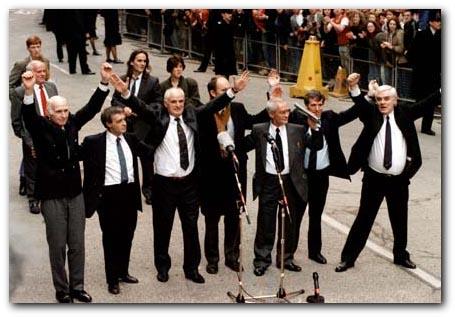"It is, and ever will be, a constant battle"

This is the second half of a two-part interview. The first part is here. By Colin Murphy.
Gareth Peirce has been fighting for the rights of prisoners and the wrongfully accused since the mid 1970s, representing Judith Ward, the Birmingham Six and the Guildford Four, amongst many others. Though her successes ultimately lead to a measure of legal celebrity (which she disavows), for many years the outlook was bleak. What sustained her?
“It’s a joint endeavour… You’re in it with the men and their colleagues and their wives.”
Surely there were periods when it seemed fruitless? “But it’s an emergency,” she says, “they’ve got to be got out!”
She is hostile to any attempt to probe her personal experience: “no difficulty any lawyer might have experienced came close to what the defendants experienced.”
Ultimately, success came about due to a combination of legal experiments and challenges, public campaigns, and political influence. Peirce has been told that Bill Clinton watched the Guildford Four film, In the Name of the Father, the night before he decided to grant Gerry Adams a visa to the US, against the wishes of the UK, in 1994.
“What you had to do,” she says, “was to raise consciousness in order to raise political sensitivity, until eventually it becomes more embarrassing to keep them in than to release them.”
Seeing the flaws in the system being exposed anew, but this time at the expense of Muslims in place of the Irish (as she argues), does she ever despair?
“I think probably most defence lawyers despair every day; that’s probably the nature of it.”
But she is philosophical.
“The more you see of how history unfolds, you see that it never achieves a smooth plateau - it can get up to a plateau of achievement but then it starts to slide down again. That’s what we learn from history – that it is, and ever will be, a constant battle.”
Yet there is an argument that Peirce’s successes in overturning wrongful convictions proves the integrity of the very system she has challenged. Is that the case?
“That’s what people sometimes like to think. I think when you observe how long and how accidental was the route to exposing or unravelling the worst examples, nobody could claim that gives you a triumphant system.”
Many of these cases were “played out in the public eye,” she notes, and yet “much that was mendacious and wrong and brutal was covered up for so long… I don’t think that leaves you with a diagnosis that you have the most robust system in the world.”
In the period that Peirce has been championing human rights, the society around has changed greatly; communications technologies, in particular, have made it (in theory) much easier to challenge the mainstream consensus, and to circulate information about abuses and cases of minority interest. Has this facilitated the fighting of her cases?
The opposite might be the case, she says. “Information overload.”
Over exposed to stories of abuses, “we become callous to suffering”.
“We’ve become accustomed to taking in tiny bites of information, on a 24-hour basis, so that it becomes familiar without properly entering our consciousness. It’s difficult to take the time to get to know the details and it’s the details that you need to get to know.”
Is there a solution? “Battle on - and be aware what not calling properly to account can mean.”
That system would be greatly strengthened by a written constitution, she believes.
“We don’t learn about rights in school, don’t have a constitutional mindset, we don’t think in those terms, so when the rights we have are under attack we don’t know we have them to defend them.
“I was in a taxi in Dublin once, and the driver had been in prison for a political conviction. He told me that, after he got out, he had found it difficult to get a taxi licence. But he had taken a case, argued the constitution – that he had a right to work – and won. I thought that was bloody impressive. There’s no such concept here.”
In a broader sense, it is this passion for the law that animates her.
“I think there is a beauty in constitutional philosophy, in the idea that there is something to hang onto in the societies in which we live that is for all time, and for everyone.”
While writing this article, and doing some absent-minded research on our own constitutional history, I stumbled upon some thoughts that seemed to anticipate Peirce’s with uncanny precision.
In May 1936, on the day before the first Seanad was abolished, its chairman, Thomas Westropp Bennett, made a fine, short speech in praise of its role in helping to “build and strengthen this infant State”. (The speech is online here.)
He said:
“If we, who are in the sere and yellow leaf, are approached for our counsel, I hope we shall say: ‘Work for the law, by the law, and with the law.’ Thus only will democracy be preserved and strengthened.”
In the conclusion to her recent book, Peirce writes:
“In age after age, societies look back and ask how it was that so many went along with what happened and with the consequences. Without knowing and accepting the truth in its entirety, how do we re-order the society in which we live? Nor is it possible to do so without an unqualified commitment to the principle fundamental to the rule of law: that it applies to all, without exception.”
